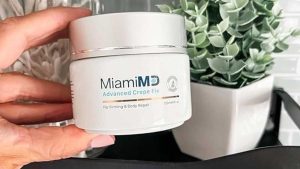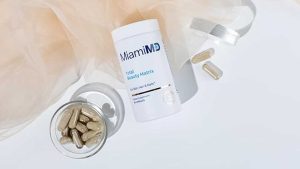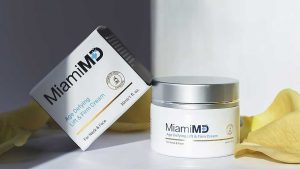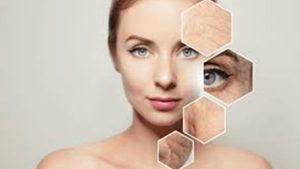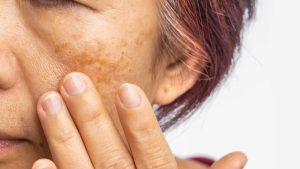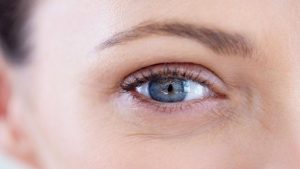How to Fix Chapped Lips
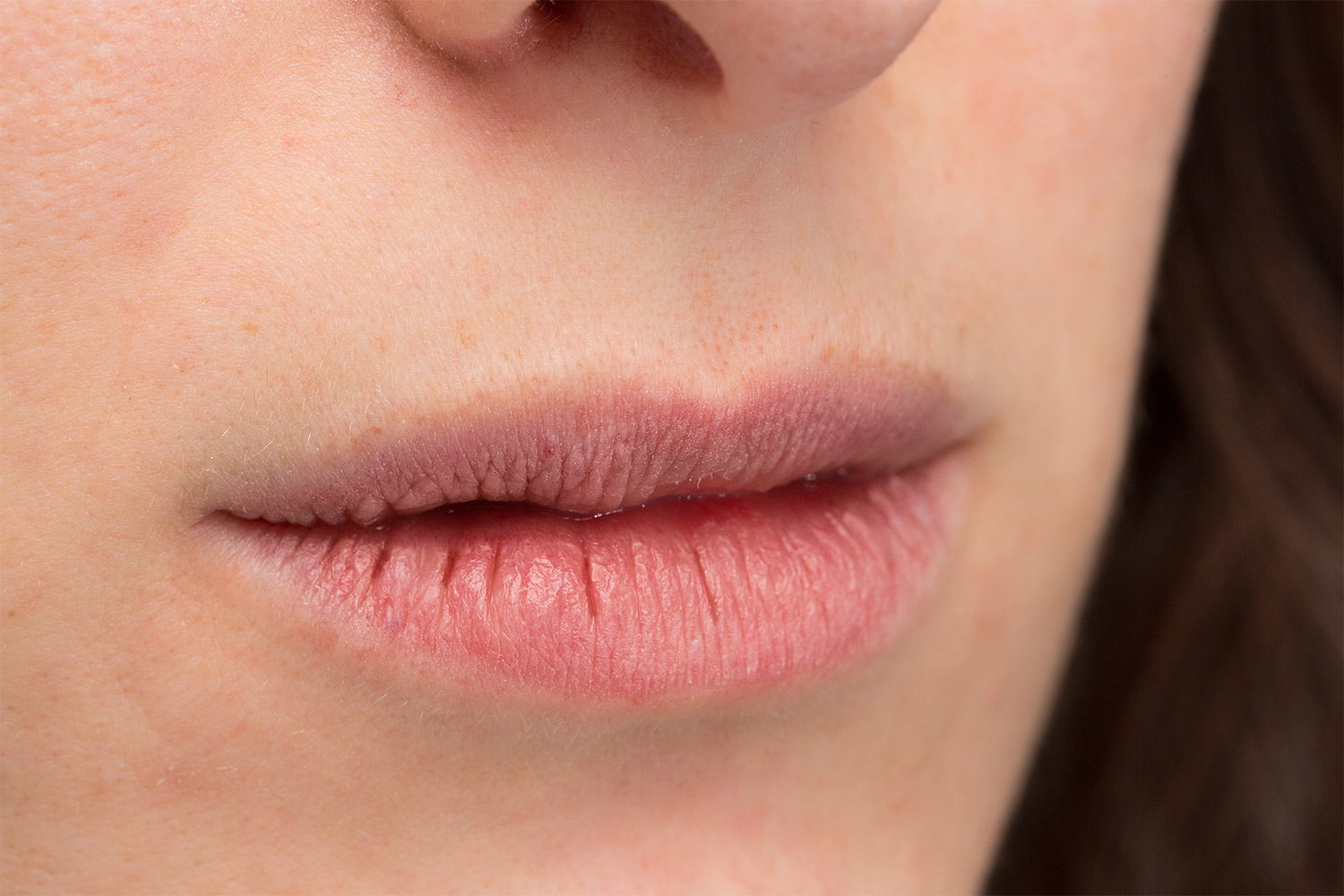
Lip health is an issue that often ends up on the bottom of most people’s priority list. If your lips are healthy, they do not require all that much attention. However, if your lips are chapped, you may have a hard time focusing on anything else. Unfortunately, chapping the lips is a common but uncomfortable problem during the summer and winter seasons.
Want to know more about how to fix chapped lips? Whether you are struggling with chapped lips or just looking for a way to prevent your lips from becoming chapped in the future, the skincare professionals at Miami MD are here for you.
We’ll provide you with all the information you need to maintain optimal lip health so that they stay soft, smooth, and beautiful even in the most extreme weather conditions.
Understanding The Basic Lip Anatomy
An essential part of lip anatomy is that the skin the lips are made of is different from the skin found on the rest of your face (and the body in general).
Most of the skin is composed of three distinct layers — the hypodermis, dermis, and epidermis. The protective top layer of that skin, the corneum, has between 15 and 16 sublayers of its own. The corneum of the lips, on the other hand, only has three to four.
That means that the lips have far less natural protection and barrier, so they mean more attention and care from the outside.
Not only do the lips not have as much ability to protect themselves, but they also don’t contain a crucial layer of the epidermis known as the stratum corneum. If you are well versed in skincare, you likely know that this layer of skin is regularly referred to as the moisture (or skin) barrier. The stratum corneum is crucial for maintaining the skin’s moisture balance and general aid and to help protect from ultraviolet radiation from the sun.
An interesting fact about lips is that they appear so pink because of how thin the skin is. It isn’t the skin of the lips that is pink, but that the blood vessels underneath are more visible.
One other area of the anatomy of lips that plays a role in the formation of chapping is that, unlike most of the rest of the skin, the lips don’t produce their own sebum. The reason for this is that the lips do not contain sebaceous glands.
Sebum is crucial for helping to protect the skin, providing it with additional hydration so that it doesn’t experience dryness, peeling, or cracks. Because the lips lack this natural component, it needs more outside protection.
What Exactly Happens When The Lips Get Chapped?
Chapped lips, a condition known medically as cheilitis, happen when the skin of the lips becomes irritated and swollen. While chapped lips are often viewed as a single condition, there are multiple forms of cheilitis.
For example, actinic cheilitis (a form of actinic keratosis that happens all over the lips) is due to chronic sun exposure. Angular cheilitis occurs just in the corners of the mouth and happens more spontaneously. In addition to those two forms, there are at least eight others. Luckily, the vast majority of chapped lips are managed in similar ways.
What Can Cause Chapped Lips?
Various factors can trigger chapped lips, most of which are not related to any underlying health condition.
- Weather extremes (both hot and cold weather)
- Frequent lip licking
- Mouth breathing
- Nutritional and vitamin deficiencies
- Dehydration
- Spicy or irritating foods
- Contact dermatitis
If you regularly suffer from chapped lips, try to keep a log of when they occur. Keeping track can help you narrow down potential causes so that you can institute targeted change and the proper preventative techniques.
How Do You Fix Chapped Lips Fast?
Unfortunately, there is no magic remedy to heal chapped lips fast. Healing your sore, cracked lips is more about helping them get the moisture they need to heal themselves more easily.
Here are some of our favorite tips and tricks, backed by the American Academy of Dermatology experts, to help support your chapped lips as they heal.
Invest In a Quality Lip Balm
Knowing which ones work and which are just hype can be tricky with so many lip balms out there. It comes down to knowing what ingredients to look for that can soothe dry lips and which ingredients may be doing more harm than good.
According to the AAD, the first step is checking your lip balm to confirm that it does not contain any of the following ingredients. Keep in mind that this is not an exhaustive list.:
- Artificial flavorings, especially cinnamon, citrus, or mint
- Artificial fragrance
- Camphor
- Eucalyptus
- Menthol
- Salicylic Acid
On the other hand, lip balms that contain the following are likely to be more supportive and not dry your lips out further:
- Ceramides
- Dimethicone vitamins
- Mineral oil
- Petrolatum
- Petroleum jelly (especially white petroleum jelly)
- Shea butter
Don’t be fooled by a lip balm that tingles or stings when you put it on your lips. The chances are that lip balm contains an ingredient that is irritating to your lips. A quality lip balm that is soothing and protective for your lips shouldn’t hurt to apply, and it does not mean that it’s working.
Try Home Remedies
If you would prefer to use products you already have in your own home to help heal your chapped lips, the answer may be as easy as a trip to your kitchen. While these home remedies may not be as beneficial as over-the-counter lip balms, they can still help to moisturize your lips and give them a little more support.
Aloe vera, for instance, is often used to help soothe painful sunburns. The same method of action that allows the gel to help the sunburnt skin feel better also helps make chapped lips less painful. It’s also full of antioxidants, vitamins, and minerals that rehydrate the skin.
Honey is another impressive home remedy for chapped lips. In addition to being delicious, honey is incredibly moisturizing and is full of antioxidants. It also has antibacterial properties, helping to prevent infections from forming in the vulnerable, cracked lip tissue.
And finally, a fan favorite — coconut oil. People use coconut oil for different health and beauty uses, from oil pulling to hair conditioning. If you already have a jar in your kitchen cabinets, coconut oil can act as an emollient and soften the skin.
Stop Biting and Licking Your Lips
When your lips are chapped, they’re probably all that’s on your mind. It’s natural to want to lick your lips to naturally wet them with your saliva, especially if they feel more dry than usual. You may even find yourself absent-mindedly biting or picking at them. While this may be temporarily satisfying, these habits will leave your lips even drier and chapped over the long run.
If you find yourself having a difficult time breaking these habits, keep a supportive lip balm handy. Apply the lip balm instead when you feel yourself getting ready to bite, lick, or pick at your lips.
How Can I Prevent Chapped Lips?
Once you get your lips back to feeling good and looking beautiful, the next logical step is to make sure to protect them moving forward. After all, the best treatment really is prevention.
Invest in a Humidifier
Cold weather can wreak havoc on the body. When you spend too much time in the dry air, it can naturally sap the moisture from your skin. Adding a humidifier to your home can help put water back in the air, which is excellent for helping support the body inside and out.
Humidifiers are recommended to help keep the skin moisturized in general, especially for those looking for ways to keep their skin looking youthful.
Use Sun Protection
Yes, even your lips need sunscreen. In reality, your lips may need sunscreen more than any other part of your body because they have even less of an ability to protect themselves from UV rays. However, instead of having to slather on sunscreen, you can protect your lips from the sun by choosing the proper lip balm.
Look for lip balms that soothe your lips and offer an SPF of 30 or above. Using SPF protection is essential all year round, and not just in the summer. Also, just like with sunscreen, you’ll need to reapply it every two hours to maintain protection.
Use Lip Scrubs Regularly
Lip scrubs can be both a treatment and a prevention technique, depending on the severity of your cheilitis. If your lips are severely chapped, you may want to wait until they have had more time to heal before using a scrub, as it can be painful and do more harm than good.
However, if your lips are only mildly chapped, or if you’re not noticing any signs of cracking or peeling, a lip scrub may be just what your lips need.
Like the rest of the skin, the lips have a layer of dead skin cells sitting on the outermost layer. This layer of cells can make the lips appear more cracked and dry and stop balms and home remedies from being able to penetrate the tissue to more efficiently help.
You can purchase an over-the-counter scrub or just use coarse sugar or baking soda. Using your finger, gently rub the scrub on your lips, remove the dead skin cells, and leave your lips smooth.
After you are done with your lip scrub, apply an occlusive moisturizing product that helps to seal in moisturizer. You can even use this step as part of your day-to-day anti-aging skincare routine, whether or not you’ve used a scrub that day.
Prevent Vitamin Deficiencies
Many vitamin deficiencies count chapped lips among their list of symptoms, especially the B-complex vitamins. Unfortunately, the B vitamins are some of the most common vitamin deficiencies due to some people’s difficulties getting them into their diet.
Vitamin C is another one that people tend to be lower in, although some of the highest vitamin C foods can also irritate chapped lips.
In order to prevent these deficiencies, you’ll want to focus on eating a healthy diet. Fresh fruits and vegetables, lean proteins like chicken and turkey, and whole grains can often give you the total recommended daily allowance of most vitamins and minerals.
To help balance that out, you may also want to add a beauty supplement.
Drink Plenty of Water
Dehydration is one of the major contributors to developing chapped lips. Part of how to fix chapped lips is focusing on the whole body, just like preventing vitamin deficiencies. That means making a conscious effort to drink more water throughout the day.
When you work on your overall hydration, your entire body will work more efficiently. A side effect of a more hydrated body is that your lips are also more hydrated and resilient.
If you notice increased thirst sensations, more headaches, dry mouth, or dizziness, it may be a sign that you are already dehydrated. While science is continually changing and has moved away from a standard “eight 8-ounce glasses” of water a day for everyone, that is still an excellent place to start.
In Summary
Learning how to fix chapped lips can keep you more comfortable, no matter the season. Developing a skincare routine that helps maintain your lip health is crucial and just as important as supporting the health of the rest of your skin.
In fact, because the skin on your lips is thinner than the skin on the remainder of your body, it may even need more of your help.
Helping you retain your youth and beauty is one of our main goals at Miami MD.
Whether you need tips for dealing with chapped lips or products to help trigger additional collagen production, we’re here to help.
Sources:
DIFFERENTIAL DIAGNOSIS OF CHEILITIS – HOW TO CLASSIFY CHEILITIS? | PubMed (nih.gov)
Seven dermatologists’ tips for healing dry, chapped lips | AAD
